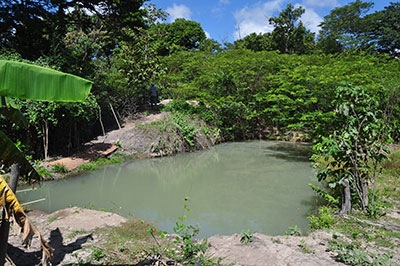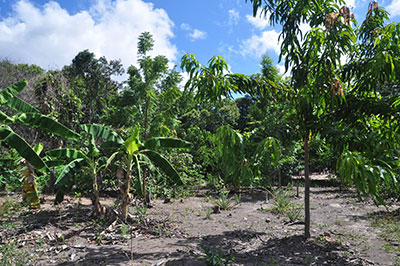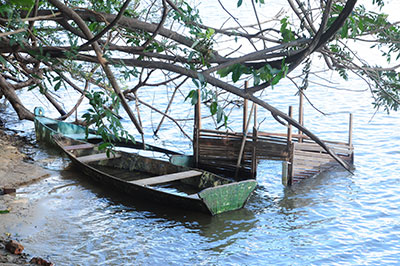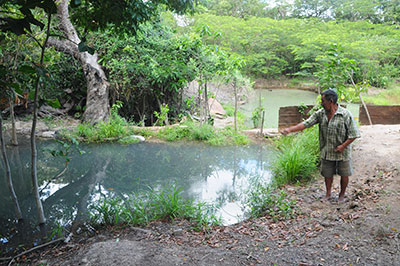— returns to field to provide for family
IT is the desire of 69-year-old Ernesto Farias of St Ignatius Village, Region Nine, to have a thriving fish farm that will help him to sustain his family.

Recently, Farias, who was a well-digger, told the Guyana Chronicle that he has lost lots of markets because of the rainy season which resulted in massive floods across the Rupununi.
But not daunted by the floods, he is determined to expand his fish farm, but is in search of help to properly develop the farm. As such, the father of seven is hoping that the Ministry of Agriculture can assist him in improving his trade.
He noted that now, with the advent of technology, “Things are different.” While accepting that he is of the older generation, Farias believes it is never too late to learn.
The farmer told the Guyana Chronicle that it was out of desperation that he started his small fish farm, located behind the National Agricultural Research and Extension institute (NAREI), in the said village.

He recounted that the fish farm was started three years ago after he fell into a well he was working on and became incapacitated for about a year.
“It is about three years now I started the fish farm because I had an accident and I had to do a lot of therapy. For me to go to Lethem, it is $1000. I have to spend every day so instead of that, I came here,” he said.
Before the accident, he said he had pneumonia but was unaware.
A number of tests were done on him at the Lethem Regional Hospital to no avail, he said, pointing out that he was only diagnosed after he fell into a 21-foot well and hit his head, rendering him unconscious for three days.

He was rushed to the Lethem Regional Hospital, after which he was transferred to a hospital in neighbouring Boa Vista, Brazil.
It was then he was diagnosed with pneumonia, an infection in one or both lungs which can be caused by bacteria, viruses, or fungi.
“I got eye turn and fell in the well and hit my head and I was left paralysed… for 11 months I couldn’t eat, or talk —that’s why I had to do a lot of therapy; I couldn’t move these hands,” he recounted, while noting that it was the fish farm that helped with his therapy and allowed him to regain some strength.
NO GIVING UP
Though not back to where he was physically, Farias said he continues to persevere since he has got his family to maintain.
“This was a little stream, I dug it doing therapy every day for three months, me alone and then my wife came and asked what I am going to do here…. I say I am going to mine fish… the first set of fish I put here was Cootei,” he explained, as he pointed to the various areas of his small fish farm.

When he began, he said it was in the dry season and there was a scarcity of water so he had to pump water from the Takutu River to the farm every day into the pond, which is about six feet deep. From then onwards, all seemed well.
“Then I got through with the fishes and I got sales and I did alright – sales was going good… everyday people use to come and buy fish $1200 a kilo… they come and they catch the fish themselves and the children come and enjoy catching fish with rods,” he said with a slight grin on his face.
But just as his fish farm started to boom, the rainy season came and water rising from the Takutu River resulted in massive floods which washed away all of his fish.
“With this rainy season I lose a lot, the water rise about 10 feet… up to the kitchen… I tried but I couldn’t do better… I had about four types of nets around the pond here, but the force of the water lift up the net and all the fishes are gone,” he said.
But notwithstanding the difficulties to start all over again, Farias said he is committed to ensuring that his fish farm is successful.
“I’d like to uniform it, make it nice… here was a little stream and I went five feet down and I have pipes under there to drain this water— pipes pulling fresh water as well,” he said and accepted that there must be better techniques he can use to ensure that his fish farm is safe and hygienic.
Currently, he has only Lukanani fishes but he hopes that by early 2018, he can expand the types of fishes within his farm.
“It is hard starting over,” he told the Guyana Chronicle, while noting that he will not give up. “I have my disability but I still farm, I have my cassava farm, I rear ducks, many died as a result of the flood…but I will keep pushing.
“If I can get some help, this farm can be something even tourists will want to see… I don’t know that there are too many fish farms in this country, I could be wrong…but mine, though small can show the types of fishes we have here in the Rupununi,” he continued.












